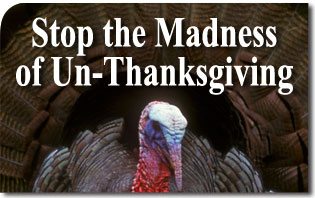 As we gear up for the Thanksgiving holidays, many are preparing to engage in a strange new ritual that is crowding out the traditional turkey and pumpkin pie. The ritual, of course, is the extension of Black Friday shopping into Thanksgiving Day. It is a practice so shocking that we might as well create a new holiday—un-Thanksgiving—since nothing could be more contrary to the intention of the real holiday than its present evolution.
As we gear up for the Thanksgiving holidays, many are preparing to engage in a strange new ritual that is crowding out the traditional turkey and pumpkin pie. The ritual, of course, is the extension of Black Friday shopping into Thanksgiving Day. It is a practice so shocking that we might as well create a new holiday—un-Thanksgiving—since nothing could be more contrary to the intention of the real holiday than its present evolution.
This year, media will again report on frenzied shoppers mobbing retail stores in search of super bargains. People will camp out in front of giant box stores for hours on end to get the jump on their fellow bargain hunters. Indeed, there is the extreme case of some fanatical California shoppers camping out at Best Buy a full twenty-two days ahead of the un-Thanksgiving stampede.
Undoubtedly, such shoppers will find bargains. And retailers will also be making lots of money. But the new un-holiday is not about bargains. It’s about joining in the frenzy. It’s about the thrill of entering into a culture of unrestraint. ”Joining in the frenzy” has been with us for a long time. It is a manifestation of a deeper problem that has long plagued our culture. There is what might be called a restless spirit of frenetic intemperance inside modern economy that helps destroy limits, break down traditional institutions (like Thanksgiving) and encourage instant gratification.
Un-Thanksgiving just takes this experience to new depths. In this new buying binge, we see more clearly the terrifying consequences of our extreme individualism that leads people to enter, to paraphrase Hobbes, into a veritable “war of every shopper against every shopper.” We sense the frustrating burden of materialism that compels shoppers to buy the latest and greatest gadgets that will eventually clutter their basements and garages. There is the paradox of celebrating a bland and sterile secularism on a day set aside to thank God for His blessings.
The result of this “joining in the frenzy” is that we are losing that human element so essential to life together in society. Things are becoming cold and impersonal, fast and frantic, bland and superficial. Un-Thanksgiving is not just a shopping spree; it’s a brutal celebration of this cold, frenetic spirit.
There are three reasons that might be cited to explain why this un-holiday has only appeared now.
The first is because of the ever-accelerating pace of life. In our culture of unrestraint, everyone must have everything, now, instantly, effortlessly. Marketers have ramped up the calendar to sell things earlier. Technology has responded with newer and faster ways to spend the money we often don’t have. Ironically, un-Thanksgiving is made possible by i-Phones, i-pads and so many uberdevices that facilitate our mad rush to experience life ever faster…and that are sold at giant discounts on a now Black Thursday.
The second reason is more profound. Un-Thanksgiving involves “joining in the frenzy,” which speeds us up. Real Thanksgiving is about connecting with family, community and church that slows us down.
Indeed, the sad state of our social institutions is what makes this frantic un-holiday possible. When family ties wither, mature adults can spend twenty-two days camped out in front of Best Buy to get gadgets “to die for,” rather than stay home and cultivate values to live for.
On the contrary, Thanksgiving happens when the norm of life is for each individual to belong to a family, community and parish church. Then, traditions, customs, habits, and ways of being can be passed down from generation to generation. These three social anchors provide a solid mooring for a “Thanksgiving” society.
Today, these institutions are no longer anchors, but options. The present culture encourages so many to opt-out of all three. At the same time, we are all pressured to accept the option of “joining in the frenzy.” We have now reached that tragic tipping point where frenzy can compete with tradition…and tradition often loses.
The final and most important reason why this un-holiday has appeared is because our secular society has effectively dethroned God to whom we should render our thanksgiving. A politically correct tyranny has exiled God from the public square, the school and workplace. Even in the home, God is often ignored amid the rush of everyday life. When God is no longer the object of our longings, the spiritual vacuum will be filled by material idols found in our shopping-mall temples on major un-feast days.
Fortunately, the notion of Thanksgiving still resonates in the hearts of many Americans. They deplore the exploitation of the holiday and seek a return to order. However, it is not enough to simply return to the turkey and fixings. Rather, we must stop “joining in the frenzy” that destroys economies and cultures. We must reconnect, give thanks and have recourse to God and call upon His blessings

